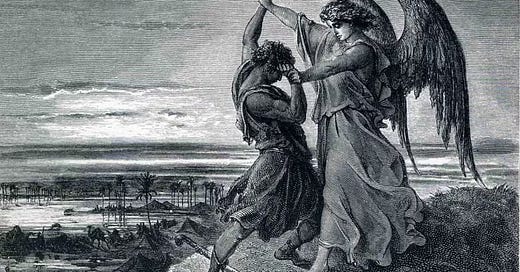Tony Kushner's Backyard Zion
The themes explored in Angels in America appear to intertwine with Kushner's nuanced stance on the Israel-Palestine conflict.
“There is no Zion save where you are. If you can’t find your heart’s desire in your own back yard, you never lost it to begin with.”
So says the angel in Tony Kushner’s Pulitzer Prize-winning epic play Angels in America, when the heavenly creature visits Prior Walter, a man critically ill with AIDS. The angel says many interesting, poetic lines in this scene, but this bit has always stuck out to me (well, since my unhealthy obsession with the play in college). The angel tells Prior that humanity’s endless proclivity toward progress, “toward movement,” has driven God away from heaven, and in his absence, endless suffering, such as AIDS, has been wrought upon humans. She commands that we “must stop moving,” as we as a race “do not advance, only trample.” With this in mind, the line of “there is no Zion save where you are” serves a metaphor that happiness is not something out there, and if you endlessly seek change to attain it, you will destroy yourselves.
Kushner spoke on the Ha’aretz English podcast last week in light of Angels in America: Perestroika playing in Hebrew at the Cameri Theatre in Tel Aviv (I saw part one, Millennium Approaches, last year, and it was excellent), but also because it is especially in vogue to ask Jewish creatives about Israel and Palestine, certainly those whose work is overtly political like Kushner’s.
In the interview, Kushner walks a tightrope. He castigates Netanyahu and his government of messianic charlatans and the scale of the IDF operation in Gaza. He condemns Israelis for supporting the war and says he is not morally opposed to boycotting the Jewish state…but he himself would never do it. He commends Israelis for disapproving of their government, denies that he was a “founding member” of Jewish Voice for Peace, a militantly anti-Israel (and antisemitic) organization, and also that Zionism is a colonialist or racist project. But he later questions whether nation states can protect minorities, and asserts that for him, the Fourteenth Amendment of the US Constitution embodies the ideals akin to "Zion," and thus, his concept of "Zionism."
The contradictory sentiments expressed by Kushner echo those of many Jewish liberals in the west. I know many individuals who, while they may feel sympathy toward Israelis and the idea of a Jewish state, are hesitant to label themselves Zionists. They harbor reservations regarding how Israel operates in the modern era. For these individuals, the pursuit of American emancipation holds greater significance. In this pursuit, akin to the promises made to Jews during the eighteenth century in Europe—where they were assured of "everything as individuals, but nothing as a people"—lies a nobler and more morally compelling narrative than the exercise of self-determination.
With this dynamic in mind, the line of “There is no Zion save where you are,” can express both a metaphorical and political message from the playwright. Perhaps Tony Kushner is making the case for the Diaspora.
But this would ignore something important: at the end of the play, the angel loses.
Keep reading with a 7-day free trial
Subscribe to Bourgeois Nationalist to keep reading this post and get 7 days of free access to the full post archives.




